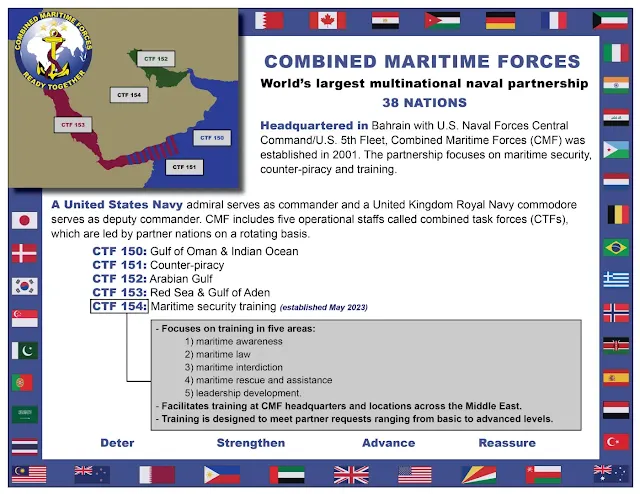 |
| Image Credit: Google |
The United Arab
Emirates (UAE) has announced its withdrawal from the United States-led Combined
Maritime Forces. It has cited evaluation of security requirements behind this
decision.
The decision
marks a significant shift in the region's geopolitical landscape and raises
questions about international cooperation in maritime security.
The UAE's
Ministry of Foreign Affairs confirmed its withdrawal from the Combined Maritime
Forces. It is a 34-Nation task force headquartered in Bahrain.
The coalition
was established to combat terrorism and piracy in the Red Sea and Gulf areas.
The UAE's
decision comes after a comprehensive evaluation of its security cooperation
with partners.
 |
| Image Credit: Google |
Commitment to
Dialogue and Regional Security:
In its
statement, the UAE emphasized its commitment to dialogue, diplomatic
engagement, and ensuring navigation safety in accordance with international
law.
Furthermore, the
nation remains dedicated to advancing regional security and stability,
safeguarding its shores, and protecting vital maritime trade routes.
Impact on
Maritime Security Cooperation:
The UAE's
departure from the US-led coalition signals a shift in dynamics concerning
international cooperation in maritime security.
With its
strategic location along crucial trade routes, the UAE had been an active
participant in the coalition.
This move
raises questions about the effectiveness of the coalition and the ability to
address maritime threats.
Recent
Incidents and Iranian Threat:
Recent attacks
on commercial shipping in the region, including the seizure of two
international oil tankers by Iran, have heightened tensions.
Iran claimed
that one tanker collided with an Iranian vessel, while the other was taken into
Iranian territorial waters following a legal complaint.
According to US
Navy, merchant Navy ship was harassed by Iran’s Revolutionary Guards in the
Strait of Hormuz. However, timely response of Navies of UK and US has prevented
the harassment.
These incidents
have underscored the need for robust maritime security measures.
US Response and
UAE's Frustration:
The US has
accused Iran of increased attacks on commercial shipping and pledged to
strengthen its defensive posture in the Gulf.
However, the
UAE expressed disappointment in what it perceived as a lack of US response to
Iranian threats.
Reports suggest
that the UAE had demanded stronger action from the US to deter Iran.
Perception of
US Failure and UAE's Sovereignty:
Observers have
pointed that UAE is frustrated with Washington's perceived failure to fulfill
its role as a security guarantor in the region.
This perception
has prompted regional players to diversify their security partnerships and
assert their sovereignty.
The UAE's
withdrawal is seen as a demonstration of its confidence and a message to the US
regarding its ability to make independent decisions.
Push for
Diversified Partnerships, including Russia and China:
The UAE's move
to diversify its partnerships extends beyond the US, including maintaining
relations with Russia and China.
The nation
seeks to serve its security interests by forging new alliances and filling
security voids where necessary.
This strategic
approach aims to ensure a balance of power and maximize its leverage in
bilateral relationships.
Conclusive
Flashpoints:
- The UAE's withdrawal from the US-led maritime coalition highlights a shifting regional landscape and the UAE's desire for increased autonomy in ensuring its security.
- This development raises important questions about the future of international maritime security cooperation in the region.
(Courtesy:
Al-Jazeera)
Post a Comment
0Comments